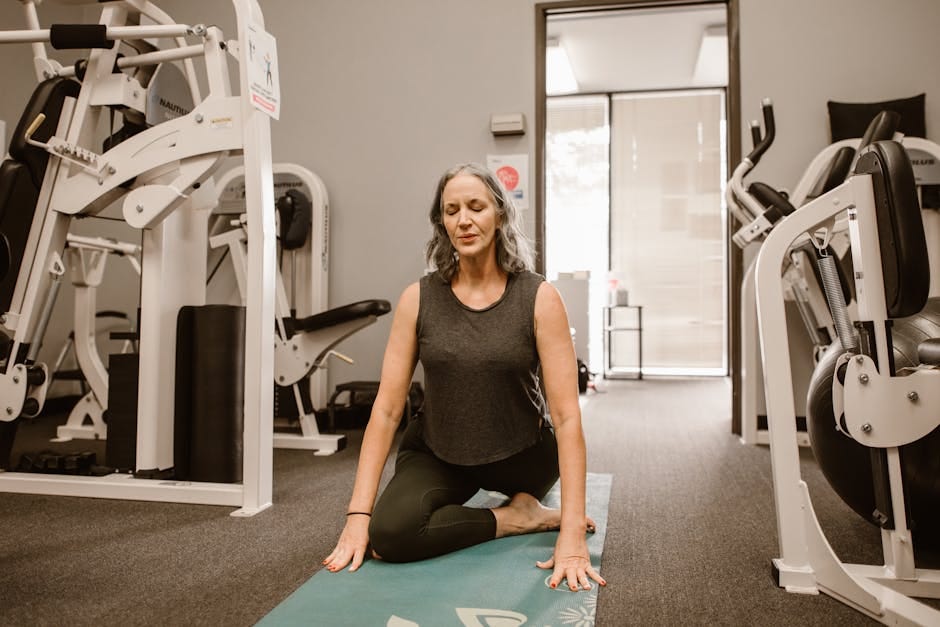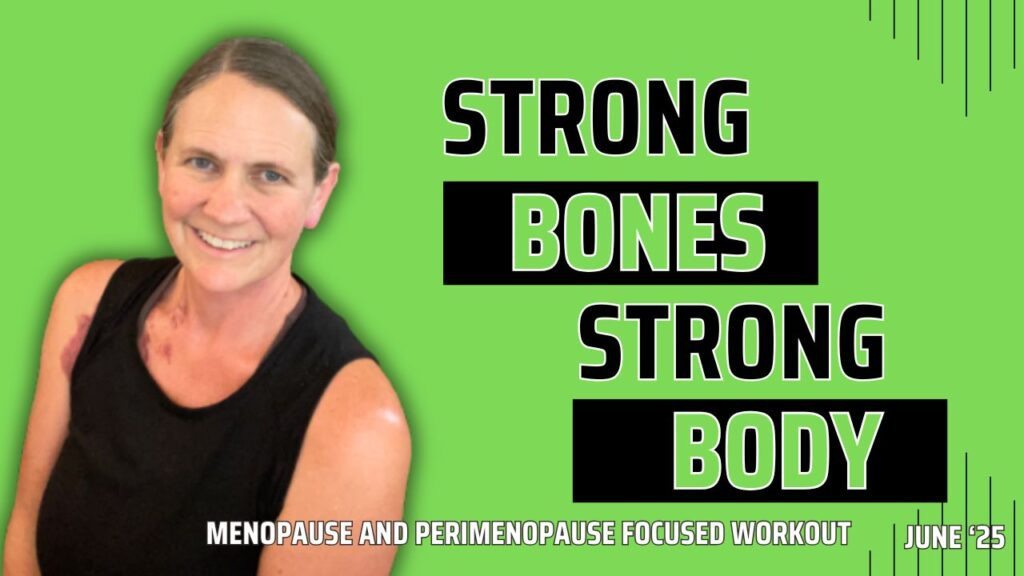Wellness in Midlife: Staying Strong in Perimenopause and Beyond
Welcome to your Midlife Wellness Reset, the first article in a series dedicated to helping women in their 50s, 60s, and beyond feel strong, balanced, and energized.
Hormonal shifts in menopause and perimenopause can change everything—your energy, metabolism, strength, and mood. But midlife doesn’t have to mean decline. In fact, with the right strategies, it can be a time of powerful transformation.
Welcome to your Midlife Wellness Reset, the first article in a series dedicated to helping women in their 50s, 60s, and beyond feel strong, balanced, and energized. This series of articles focuses on science-backed fitness and wellness practices tailored for this life stage.
Before we dive in, I want to share what inspired me to explore the topic of fitness for women in midlife. This year marked my 50th journey around the sun, and with it came a deeper curiosity about how to best support my body at this stage of life. As I began researching the unique needs of women in my age group, I realized it was time to adjust some of my own fitness and nutrition habits to better align with where I am now. Many of the women I work with are in the same stage, or a little further along, which gives me valuable perspective on the challenges that may lie ahead. It felt like the perfect time to dive deeper into this important and evolving conversation.
✳️ Before beginning any new fitness or nutrition program, please consult with your healthcare provider, especially if you’re managing a health condition or taking medications.
1. Find a Doctor Who Understands Menopause
One of the most empowering steps you can take is finding a healthcare provider who truly understands menopause and perimenopause. Not all practitioners are trained to recognize the wide range of symptoms women face during this transition, and many dismiss them as just part of aging. Believe me, this was my experience. I was given very little support from my local gynecologist. If I had not educated myself on this pivotal transition I would not have the tools that support me now.
Be your own advocate. Look for a menopause-informed doctor or specialist who takes your concerns seriously and supports a whole-person approach—whether that includes lifestyle changes, lab work, or medical options.
✅ You deserve a provider who listens, explains, and helps you feel supported every step of the way.
2. Sleep: Essential for Hormonal Health
Sleep is often one of the first things to change during perimenopause—and one of the most important to protect. Fluctuating estrogen and progesterone can affect your ability to fall asleep, stay asleep, or feel rested. A menopause-informed specialist can support you in finding the the tools to help you get the sleep you desperately need.
Quality sleep is essential for:
Hormone regulation
Energy and focus
Mood stability
Metabolic and immune function
Prioritize a restful sleep routine: reduce screen time before bed, avoid alcohol, keep your bedroom cool and dark, and try calming practices like gentle stretching, breathwork, and Yoga Nidra. Supporting sleep supports everything else.
3. Nutrition: Key Micronutrients for Midlife
Your nutritional needs shift during menopause. Beyond calories and protein, your body depends on key vitamins and minerals to support bone density, hormone metabolism, and mood.
Nutrients to prioritize:
Calcium + Vitamin D for strong bones
Magnesium for muscle, sleep, and stress support
B vitamins for energy and brain health
Omega-3s for mood and inflammation
Focus on a anti-inflammatory whole-food, nutrient-rich diet and talk with a trusted provider about whether supplements may help fill any gaps. Small adjustments can have a lasting impact.
4. Strength Training: Your Menopause and Perimenopause Superpower
Estrogen decline affects muscle mass, metabolism, and bone density, but strength training can help you counteract it. Lifting moderate to heavy weights preserves lean muscle, supports a healthy weight, improves joint function, and protects your bones.
✅ Goal: Strength train 2–3 times a week using challenging weights that bring you close to fatigue in 8–10 reps.
🕒 Tip: Allow at least one rest day between strength workouts to give your muscles time to recover and rebuild.
5. Add Weight-Bearing Movement on Rest Days
On non-lifting days, engage in weight-bearing cardio like brisk walking, dancing, or stair climbing. These activities support bone density, heart health, and mobility without overloading your system.
✅Aim for: 30 minutes of moderate movement most days of the week or 150 minutes per week.
6. Short Bursts of Jump or Impact Training
Emerging research in the menopause and perimenopause fiend shows that short, low-impact bursts of jumping (like 10–20 light hops or heel drops) a few times a week can stimulate bone growth and improve coordination. Keep it gentle and joint-safe—try rebounding or skipping movements if appropriate for your body.
Lately, I’ve started incorporating short bursts of jump training into my classes—and my students love them. These quick, manageable cardio intervals add a fun challenge to our strength workouts while boosting confidence, energy, endorphins, and endurance. If you’re ready to experience the benefits for yourself, check out my Strong Bones Strong Body class—a comprehensive 45-minute workout designed specifically for women in perimenopause and beyond.
7. Protein: The Muscle and Metabolism Preserver
Midlife women need more protein—not less. Yet many of us under-consume it, and often load most of it into a single evening meal, which isn’t ideal for supporting muscle maintenance or energy throughout the day. Adequate protein becomes even more critical as we age, especially when strength training is part of our weekly routine.
The current Recommended Dietary Allowance (RDA) for protein is 0.8 grams per kilogram of body weight—but this is simply the minimum needed to avoid deficiency. It’s not optimal for women aiming to maintain or build muscle, support bone health, or enhance physical performance.
According to The Menopause Society, women in midlife should aim for 1.0 to 1.2 grams of protein per kilogram of body weight per day, especially when paired with regular exercise. That’s a noticeable increase over the general adult recommendation.
Protein Goal for Women Over 40:
✅ Aim for 1.0 to 1.5 grams of protein per kilogram of your preferred body weight each day.
For example: A woman whose preferred weight is 150 pounds (about 68 kilograms) would aim for 68 to 102 grams of protein daily, depending on her activity level, muscle-building goals, and overall health needs.
Distribute protein across all meals and snacks for better absorption and muscle support.
Stay tuned for our upcoming article focused on the protein needs of older women. We will dive into easy ways to reach your daily target.
8. Hydration: The Unsung Hero
Proper hydration supports everything from temperature regulation and digestion to skin health and energy. During menopause, hydration may help reduce hot flash intensity and prevent fatigue or brain fog.
✅ Goal: Aim for half your body weight in ounces of water each day.
Example: 150 lbs = 75 oz water/day
Add water-rich foods like cucumbers, melons, and leafy greens.
Infuse your water with mint, berries, or citrus for variety.
9. Support Balance, Mobility, and Core Stability
Hormonal changes can affect balance, coordination, and posture. Daily movement practices that improve mobility and proprioception help you stay agile and confident. Practice these daily:
Standing yoga poses (tree pose, knee to chest pose)
Gentle mobility flows (modified sun salutations)
Core activation and foot strengthening exercises (Pilates toe taps, toe stands)
✅ Need support getting started? Explore my on-demand library of yoga and Pilates classes, designed specifically for women in midlife. These accessible, feel-good sessions will help you build strength, improve balance, and move with greater ease—at your own pace.
10. Regulate Stress to Protect Hormonal Health
Stress isn’t just emotional—it’s physiological. Chronic stress raises cortisol, worsens symptoms like sleep disruptions or weight gain, and blocks recovery.
Build in restorative practices like:
Featured Video: Strong Bones Strong Body
Ready to put it all into practice?
I’ve created a powerful 45-minute strength-based video workout to complement this wellness guide. Strong Bones Strong Body blends dumbbell training with bone-boosting impact drills, core activation, and mobility-focused stretching. This is the perfect beginner workout for your menopause and perimenopause journey.
We’re building more than muscle, we’re building confidence, balance, and resilience for this vibrant chapter of life.
Let’s lift weights, move with joy, and feel STRONG in every sense of the word.
Now available in the library
Designed for peri + post-menopausal women
🔥 Total time: 45 minutes
✅ Props: Dumbbells + Mat
**Be sure to click on the “Videos” icon to access my library from the link below.
Coming Next in the Series…
This is just the beginning! Midlife Wellness Reset kicks off a new series where I’ll be diving deeper into each of the topics we touched on, strength training, protein, sleep, stress, mobility, and more.
UP NEXT:
A Better Way Forward: Finding the Right Care During Menopause and Perimenopause
We’ll explore how to find a provider who truly listens, understands midlife changes, and supports your whole health, not just your symptoms.
These upcoming posts are here to support you in building strength, balance, and resilience through every stage of life.
✅ Subscribe to stay in the loop, and
✅ Share this post with a friend who’s ready to feel strong, supported, and empowered in her body—through menopause and beyond
I believe in blending lived experience with evidence-based insight. If you’re curious to explore more, here are some of the trusted sources that informed this article.
References:
- [The Menopause Society – Protein Intake Recommendations for Postmenopausal Women](https://www.menopause.org)
- [NIH Office of Dietary Supplements – Nutrient Fact Sheets](https://ods.od.nih.gov)
- [Phillips, S. M., & Fulgoni, V. L. (2016). Assessment of Protein Adequacy in the American Diet. *Nutrients*, 8(7), 422](https://doi.org/10.3390/nu8070422)
- [Daly, R. M., et al. (2019). Muscle and Bone Health in Midlife Women. *Osteoporosis International*, 30(10)](https://doi.org/10.1007/s00198-019-05006-5)
- [Sleep Foundation – How Hormones Affect Women’s Sleep](https://www.sleepfoundation.org)
- [Harvard Health – Strength Training for Women in Midlife](https://www.health.harvard.edu)
- [Watson, S. L., et al. (2015). Jump Training and Bone Health in Postmenopausal Women. *JBMR*, 30(4)](https://doi.org/10.1002/jbmr.2384)






